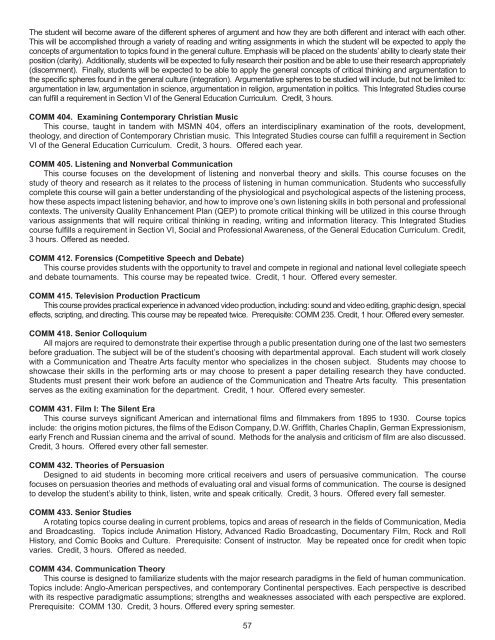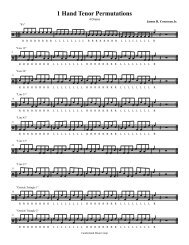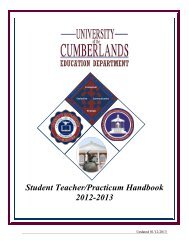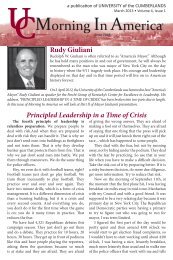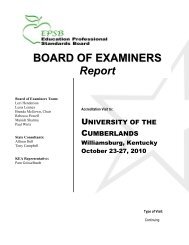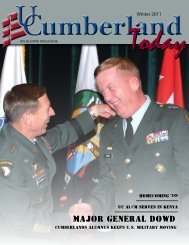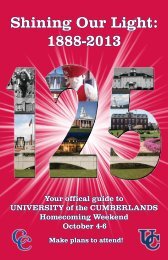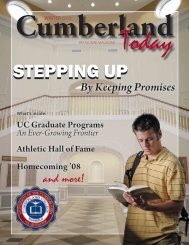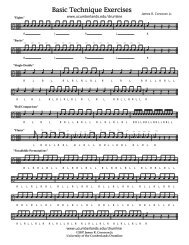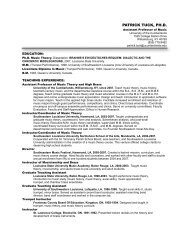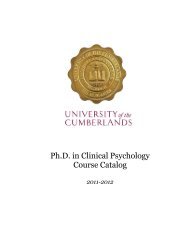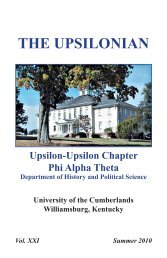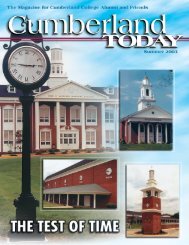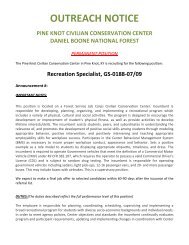2013â2014 Undergraduate Catalog - University of the Cumberlands
2013â2014 Undergraduate Catalog - University of the Cumberlands
2013â2014 Undergraduate Catalog - University of the Cumberlands
Create successful ePaper yourself
Turn your PDF publications into a flip-book with our unique Google optimized e-Paper software.
The student will become aware <strong>of</strong> <strong>the</strong> different spheres <strong>of</strong> argument and how <strong>the</strong>y are both different and interact with each o<strong>the</strong>r.<br />
This will be accomplished through a variety <strong>of</strong> reading and writing assignments in which <strong>the</strong> student will be expected to apply <strong>the</strong><br />
concepts <strong>of</strong> argumentation to topics found in <strong>the</strong> general culture. Emphasis will be placed on <strong>the</strong> students’ ability to clearly state <strong>the</strong>ir<br />
position (clarity). Additionally, students will be expected to fully research <strong>the</strong>ir position and be able to use <strong>the</strong>ir research appropriately<br />
(discernment). Finally, students will be expected to be able to apply <strong>the</strong> general concepts <strong>of</strong> critical thinking and argumentation to<br />
<strong>the</strong> specific spheres found in <strong>the</strong> general culture (integration). Argumentative spheres to be studied will include, but not be limited to:<br />
argumentation in law, argumentation in science, argumentation in religion, argumentation in politics. This Integrated Studies course<br />
can fulfill a requirement in Section VI <strong>of</strong> <strong>the</strong> General Education Curriculum. Credit, 3 hours.<br />
COMM 404. Examining Contemporary Christian Music<br />
This course, taught in tandem with MSMN 404, <strong>of</strong>fers an interdisciplinary examination <strong>of</strong> <strong>the</strong> roots, development,<br />
<strong>the</strong>ology, and direction <strong>of</strong> Contemporary Christian music. This Integrated Studies course can fulfill a requirement in Section<br />
VI <strong>of</strong> <strong>the</strong> General Education Curriculum. Credit, 3 hours. Offered each year.<br />
COMM 405. Listening and Nonverbal Communication<br />
This course focuses on <strong>the</strong> development <strong>of</strong> listening and nonverbal <strong>the</strong>ory and skills. This course focuses on <strong>the</strong><br />
study <strong>of</strong> <strong>the</strong>ory and research as it relates to <strong>the</strong> process <strong>of</strong> listening in human communication. Students who successfully<br />
complete this course will gain a better understanding <strong>of</strong> <strong>the</strong> physiological and psychological aspects <strong>of</strong> <strong>the</strong> listening process,<br />
how <strong>the</strong>se aspects impact listening behavior, and how to improve one’s own listening skills in both personal and pr<strong>of</strong>essional<br />
contexts. The university Quality Enhancement Plan (QEP) to promote critical thinking will be utilized in this course through<br />
various assignments that will require critical thinking in reading, writing and information literacy. This Integrated Studies<br />
course fulfills a requirement in Section VI, Social and Pr<strong>of</strong>essional Awareness, <strong>of</strong> <strong>the</strong> General Education Curriculum. Credit,<br />
3 hours. Offered as needed.<br />
COMM 412. Forensics (Competitive Speech and Debate)<br />
This course provides students with <strong>the</strong> opportunity to travel and compete in regional and national level collegiate speech<br />
and debate tournaments. This course may be repeated twice. Credit, 1 hour. Offered every semester.<br />
COMM 415. Television Production Practicum<br />
This course provides practical experience in advanced video production, including: sound and video editing, graphic design, special<br />
effects, scripting, and directing. This course may be repeated twice. Prerequisite: COMM 235. Credit, 1 hour. Offered every semester.<br />
COMM 418. Senior Colloquium<br />
All majors are required to demonstrate <strong>the</strong>ir expertise through a public presentation during one <strong>of</strong> <strong>the</strong> last two semesters<br />
before graduation. The subject will be <strong>of</strong> <strong>the</strong> student’s choosing with departmental approval. Each student will work closely<br />
with a Communication and Theatre Arts faculty mentor who specializes in <strong>the</strong> chosen subject. Students may choose to<br />
showcase <strong>the</strong>ir skills in <strong>the</strong> performing arts or may choose to present a paper detailing research <strong>the</strong>y have conducted.<br />
Students must present <strong>the</strong>ir work before an audience <strong>of</strong> <strong>the</strong> Communication and Theatre Arts faculty. This presentation<br />
serves as <strong>the</strong> exiting examination for <strong>the</strong> department. Credit, 1 hour. Offered every semester.<br />
COMM 431. Film I: The Silent Era<br />
This course surveys significant American and international films and filmmakers from 1895 to 1930. Course topics<br />
include: <strong>the</strong> origins motion pictures, <strong>the</strong> films <strong>of</strong> <strong>the</strong> Edison Company, D.W. Griffith, Charles Chaplin, German Expressionism,<br />
early French and Russian cinema and <strong>the</strong> arrival <strong>of</strong> sound. Methods for <strong>the</strong> analysis and criticism <strong>of</strong> film are also discussed.<br />
Credit, 3 hours. Offered every o<strong>the</strong>r fall semester.<br />
COMM 432. Theories <strong>of</strong> Persuasion<br />
Designed to aid students in becoming more critical receivers and users <strong>of</strong> persuasive communication. The course<br />
focuses on persuasion <strong>the</strong>ories and methods <strong>of</strong> evaluating oral and visual forms <strong>of</strong> communication. The course is designed<br />
to develop <strong>the</strong> student’s ability to think, listen, write and speak critically. Credit, 3 hours. Offered every fall semester.<br />
COMM 433. Senior Studies<br />
A rotating topics course dealing in current problems, topics and areas <strong>of</strong> research in <strong>the</strong> fields <strong>of</strong> Communication, Media<br />
and Broadcasting. Topics include Animation History, Advanced Radio Broadcasting, Documentary Film, Rock and Roll<br />
History, and Comic Books and Culture. Prerequisite: Consent <strong>of</strong> instructor. May be repeated once for credit when topic<br />
varies. Credit, 3 hours. Offered as needed.<br />
COMM 434. Communication Theory<br />
This course is designed to familiarize students with <strong>the</strong> major research paradigms in <strong>the</strong> field <strong>of</strong> human communication.<br />
Topics include: Anglo-American perspectives, and contemporary Continental perspectives. Each perspective is described<br />
with its respective paradigmatic assumptions; strengths and weaknesses associated with each perspective are explored.<br />
Prerequisite: COMM 130. Credit, 3 hours. Offered every spring semester.<br />
57


